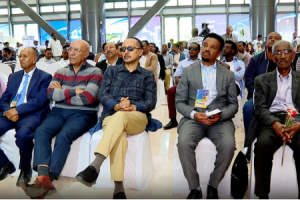
“I can see no security for African states unless African leaders, like ourselves, have realized beyond all doubt that salvation for Africa lies in unity, Kwame Nkrumah,” — a quote from first President of the Republic of Ghana, one of the founders of the Organization of African Union in 1963 and notable for leading ably the Pan-African Movement in Africa, in addition to authoring several books, including Africa Must Unite. Establishment It’s been close to two years since a foundation stone was laid to establish Adwa Pan-African University (APAU) at Adwa by the-then Prime Minister Hailemariam Desalegn and President Yoweri Musevini of Uganda.
The University is going to be built in a 150-hectare of hilly land, located in the north east section of the town of Adwa. The University will occupy a prime real estate, not far from the majestic and historic mountains of Adwa and not far from the first site of the battlefield, now called Mindibdib. Gesasso, Inda Kidane Mehret, Abune Aregawi and Semayata Mountains are visible and close to the University site.
Soloda Mountain is also nearby dominating the landscape of Adwa and far beyond, one is able to see Maryam Shewito, another battlefield site in which the Ethiopian cavalry took the battle to the highest level, giving no chance for the enemy to gain any new ground.
The University’s site provides an excellent panoramic view of the entire town and its magnificent mountain-rich surroundings. The purpose of this essay is to provide a general overview of APAU, including a short narrative on Pan-Africanism. It was also almost one year ago that the APAU Coordinating Committee, in collaboration with the Ministry of Affairs, successfully convened the first international conference in Adwa.
The theme of the conference was “Institutionalizing PanAfricanism.” It was at this conference that we are able to organize task forces, namely Curriculum, Architecture, Funding and Archives and Documentation.
These taskforces have prepared and submitted reports pertaining to prior academic issues. To this date, with regard to the task of fund raising or mobilizing resources, the Committee has managed to obtain pledges of 460 million Birr (200 million Birr from the Federal Government, 250 million Birr from the Tigray Regional Government and 10 million Birr from the Addis Ababa City Administration) for the initial phase of the construction of the University.
We are hopeful that the other regional governments will follow suit. We are also confident that the Federal Government continues to support the project. For the City of Addis Ababa, the Vice Mayor travelled to Mekelle to donate the 10 million Birr at a special ceremony at the Martyrs’ Park.
The Vice Mayor has also promised to make additional donations for the realization of APAU. The Committee members are grateful to this gesture and sense of ownership. Adwa belongs to all Ethiopians, for that matter to all Africans and people of the world.
Dr. Debretsion Gebremikael, the Chief Administrator of the Tigray Regional Government, announced a pledge of 250 million Birr in a speech he gave at the 123rd anniversary of the victory at the Battle of Adwa in Adwa.
Dr. Debretsion also met with two of the members of the Coordinating Committee on March 2nd. He was briefed on the activities of the Committee, including the issue of compensation that ought to be paid to the farmers and residents, on the Universitydesignated premise, who need to be relocated. He was also briefed on the state of curriculum preparation to begin academic program.
Dr. Debretsion, who has shown keen interest in the establishment of the University and who is consistently involved in making sure that the University becomes a reality, wants the academic program to begin immediately. Since the program begins with graduate studies, it is possible to start the program with one MA program.
There is enough material to conduct classes. There are also qualified scholars to begin a program. Dr. Debretsion suggests that we request facilities at Aksum University to begin the academic program.
Aksum University is only 25 minutes away from Adwa. The Committee may also lease homes in Adwa that may be used for office, classes and student-housing.
The Committee is hopeful that other regional governments follow the examples set by Addis Ababa City Administration and the Tigray Regional Government thereby affirming their ownership of the project. It is also the hope of the Committee to meet with Prime Minister Dr. Abiy Ahmed soon. What is Pan-Africanism?
The Pan-African Movement that began with the African Diaspora in Europe and the Americas achieved its institutional anchor with the founding of the OAU in May 1963 in the Ethiopian capital, Addis Ababa.
African leaders similarly met decades later, at the Lusaka summit, to unanimously decide to replace the OAU, having fulfilled its original mandate, with the African Union (AU). As we approach the Africa Day, which is on May 25, 2018, it is important to reflect on the steps taken to transform Pan-Africanism.
The OAU/AU, a Pan-African institution created with the principal purpose of advancing the interests of African people both on the continent and in the Diaspora, locates its roots in the concept of Pan-Africanism. According to W. Ofuatey-Kodjoe, PanAfricanism reveals itself as an ideology with a cognitive component that recognizes all African Peoples, both on the continent and in the Diaspora, as being one folk, or nation as a result of a shared cultural identity, common historical experience and indivisible future destiny. Ofuatey- Kodjoe’s definition of PanAfricanism is perhaps one of the most concise definitions given so far.
W.E.B Du Bois, the great African American thinker and widely acknowledged father of the Pan-African Movement stated its aims and objectives as follows: “Pan-Africa will seek to preserve its own history, and write the present, erasing from its literature the lies and distortions about black folks which have disgraced the last centuries of European and American literatures; … Pan-Africa seeks the end of making Africans not simply profitable workers for industry nor stool pigeons for propaganda, but for making them modern, intelligent, responsible men (and women) of vision and character.”
While old school Pan-Africanists, such as George Padmore of Trinidad and Tobago, viewed the movement “as a revolt of people of African descent against oppression and humiliation imposed upon them because of their African origin”, the new school, such as Kwame Tourè (formerly Stockley Carmichael) believed the fundamental goal of Pan-Africanism to be “the empowerment of all African people wherever they are.”
Sid Lamelle identified seven major points as the strategy by which to fully comprehend the idea and praxis of Pan-Africanism. His idea included ‘Africa as Homeland’, ‘Solidarity’, ‘Historical Restoration’, ‘Cultural Heritage’, ‘Africa for Africans’, and ‘Unity’. Consequently, Lamelles’s seven salient points of Pan-Africanism were as follows:
1. Africans and persons of African origin recognize Africa as their homeland;
2. Solidarity among men and women of African descent;
3. Belief in a distinct ‘African personality;
4. Restoration of African’s History;
5. Pride in African cultural heritage;
6. Africa for Africans in material and spiritual pursuit; and
7. Hope for a United Future of Africa. To Lamelle, the conditions that gave rise to the Pan-African idea include: the humiliation and exploitation of the African diaspora, racism, and white supremacist arguments about the inferiority of African descent, and colonialism and imperialism in Africa and in the Diaspora.
Although Nkrumah’s vision of a United States of Africa is yet unrealized, PanAfricanism has registered a number of historical accomplishments. As a political movement, it has substantially contributed to the struggle against colonialism and apartheid in Africa and against white supremacy in the United States.
Pan-African principles were behind the formation of Marcus Garvey’s the United Negro Improvement Association (UNIA) in the United States in the 1920s. UNIA became one of the largest peoplecentered Pan-African organizations in the diaspora with over 5 million members.
UNIA was described as such due to its objective of addressing the social, cultural, and economic issues facing Africans globally. When one reflects on the history of the Pan-African Movement, it is extraordinary to note how ordinary men and women transcending their confined identities at great personal cost to their lives in order to advance the cause of Africans.
In fact, the Movement has produced some of the most principled and influential freedom fighters and thinkers in history. From the first Pan-African Conference in 1900 in London initiated by Henry Sylvester Williams to the fifth Congress in Manchester, England in 1945, Pan-African aims and objectives underwent fundamental transformations. It made a qualitative shift from an appeal to “well-meaning” colonial masters to improve the conditions of their colonial subjects to an explicit demand for self-determination, freedom and independence of African peoples and countries. Institutionalizing Pan-Africanism: Political Dimension The Pan-African Movement reached its zenith when the leading actors of the African political realm, Kwame Nkrumah and Emperor Haileselassie I came together to play their leading roles in the founding of the Organization of African Unity (OAU) in Addis Ababa, Ethiopia in 1963.
The establishment of the OAU, in fact, is one of the great milestones in the history of African people. With this, it was hoped that the OAU would become instrumental in promoting political, cultural, and economic cooperation and unity in Africa.
The OAU/ AU has yet to achieve those lofty goals, and has in the process faced numerous challenges in the wake of the pervasive neocolonial blocks, boundaries, and identities prevalent on the continent. Nkrumah recognized these neo colonial schemes in Africa at its earliest stage and cautioned African states to seek African-centered development. In an editorial entitled “What Mandela Means to Our Future”, the editor of the Michigan Chronicle wrote: “Nelson Mandela, a universal symbol of freedom, has also exposed a major challenge for Africans on the continent and abroad.
The world’s nations are clustering themselves around political ideologies, religious, ethnic groupings and geographical location…Africans throughout the world must recognize that their place has not been reserved in any of these alliances. To move forward in the next century and eventually cooperate meaningfully with other groups – Africans must first coalesce with each other.
The time is here when Africans facing environmental, development and health crisis in both Africa and abroad must pull their resources, skills and talents for their very survival.
The African Union must continuously strive to provide a platform for Africans to play a significant role in world affairs. It must be a source of strength for us to relate to ourselves and the rest of the world with dignity, self-confidence and self-respect. We should be actively involved in the shaping of the new Union so that it would become a bastion of human rights, indigenous peoples’ rights, women’s rights and rights of all our people on the continent and in the Diaspora. The African union must strive to be self-reliant.
The resources needed to run our institutions ought to be generated from within, thus avoiding the neocolonial strings attached to resources from abroad. Institutionalizing Pan-Africanism: Cultural Dimension At a conference held in Adwa at the end of February 2016 in conjunction with the 120th anniversary of the victory at the Battle of Adwa, a citizens’ group publicly announced a plan to establish a Pan-African University in Adwa.
The symbolic and historical significance of Adwa, particularly in the context of the African World, were taken into consideration in making the announcement. In 1896, eleven years after the Berlin Conference, the Ethiopian army defeated the invading Italian forces at the Battle of Adwa. It was a decisive battle because it aborted Italy’s ambition to establish a colonial foothold in Ethiopia. The victory at the Battle of Adwa set the stage for the beginning of the end of colonialism in Africa.
Adwa, therefore, is significant because it disturbed the colonial order in the world. Colonial subjects interpreted Adwa as a call to resist and defeat colonialism and racial oppressions throughout the world. With Adwa, they have a permanent symbol and a constant reminder that colonialism was wrong and it ought to be defeated.
No system is just as long as it treats human beings as objects and fodders to exploitative and profitable economic systems. Citizenship is a right that cannot be denied and that should be exercised if at all freedom is a universal right of peoples and communities. Adwa, to many, was not simply an Ethiopian victory, but an African victory as well.
The 1884/85 Berlin Conference was convened to divide up the entire continent of Africa and assign colonial territories to European powers. The Europeans allocated the Horn of Africa to Italy. Italy’s military push in Ethiopia is a part of the European colonial design in Africa. Adwa inspired resistance and anti-colonial movements in the African world.
In 1963, the first step was taken to institute continental Pan-Africanism by founding the Organization of African Unity (OAU). At its 50th anniversary, the Organization was strengthened by transforming itself into the African Union (AU). AU has crafted Agenda 2063 and, at present, efforts are being exerted to put into practice.
As another step to continue the institutionalization of PanAfricanism, Ethiopian citizens, in 2016, took the initiative to establish a university in Adwa for the primary purpose of advancing PanAfrican causes. Establishing a Pan-African institution of higher learning is viewed as a way of implementing Agenda 2063. Adwa Pan-African University (APAU) commits itself to address and advance PanAfrican issues in line with Agenda 2063 of the African Union and the Africa Decade Program of the United Nations.
With the establishment of APAU, Adwa will become a major hub and center of excellence for PanAfricanism and African Renaissance. Fifty-five years ago, at the founding summit of the Organization of African Unity (OAU) in 1963, Emperor Haileselassie I had proposed the founding of an African University where the continent’s youth and future leaders would be nurtured together at one site in Africa.
His dream was not realized until AU has begun to open PanAfrican Universities in five regions of the continent. Adwa Pan-African University is intended to compliment the AU’s Universities. While the AU Pan-African Universities are established on the basis of equity and geography, APAU is going to be a standalone University with Pan-African center of excellence.
As Addis Ababa is the political capital of the AU, Adwa will become the center of historical knowledge and archives about the African World.
Herald March 22/2019
BY DR. AYELE BEKERIE





